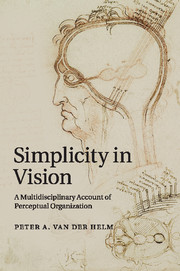Book contents
- Frontmatter
- Dedication
- Brief contents
- Extended contents
- Figures
- Tables
- Boxes
- Credits
- Preface
- Prologue Levels of vision, description, and evaluation
- Part I The theoretical cycle
- Part II The empirical cycle
- Part III The tractability cycle
- Epilogue Towards a Gestalt of perceptual organization
- References
- Author index
- Subject index
Preface
Published online by Cambridge University Press: 05 January 2014
- Frontmatter
- Dedication
- Brief contents
- Extended contents
- Figures
- Tables
- Boxes
- Credits
- Preface
- Prologue Levels of vision, description, and evaluation
- Part I The theoretical cycle
- Part II The empirical cycle
- Part III The tractability cycle
- Epilogue Towards a Gestalt of perceptual organization
- References
- Author index
- Subject index
Summary
Human vision research aims to understand the neuro-cognitive process that, taking the light in our eyes as input, enables us to perceive scenes as structured wholes consisting of objects arranged in space. This perceptual organization process is believed to be one of the automatic brain processes that underlie consciousness and, thereby, virtually every impression we experience and virtually every action we undertake. In other words, we may take this process for granted in our dealings with the world, but it is a basic mechanism not only in daily life but also in nearly every scientific research domain. Human vision research is an exception in that it takes this mechanism as the very topic of study.
It recognizes that the perceptual organization process, by all accounts, must be very complex and yet very flexible. To organize meaningless patches of light into meaningfully structured wholes within the blink of an eye, this process must combine a high combinatorial capacity with a high speed. Aristotle (±350BC/1957) already realized that the eyes are not merely windows to the world, and he predicted that “In a shorter time, more will be known about the most remote objects, namely the stars, than about the most nearby topic, namely perception”. Indeed, more than two thousand years later, Gestalt psychology still posed the pivotal question “Why do things look as they do?” It also proposed a promising beginning of an answer, however.
Information
- Type
- Chapter
- Information
- Simplicity in VisionA Multidisciplinary Account of Perceptual Organization, pp. xx - xxivPublisher: Cambridge University PressPrint publication year: 2014
